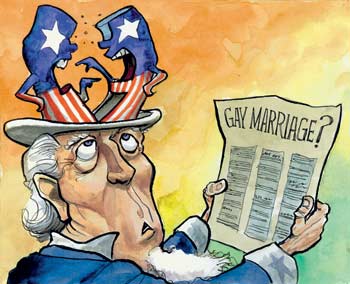
"America is particularly prone to battles over culture." ("How to lose the culture wars," Lexington, The Economist, 1 June 2006.)
Compared to its European cousins, America is the lone prude of the family. While France, Denmark, and Germany barely blink an eye when it comes to abortion and gay marriage, the U.S. is torn asunder by these culture wars.
Such wars are understandable because the U.S. is a devout nation. Many of her citizens pray every day and attend church regularly. Issues like abortion and gay marriage cut deep into the American heart because they are entwined with morality---the sanctity of life and the sanctity of marriage. When this sanctity is defiled, religious Americans rise up to defend their values.
This week in Washington, the Federal Marriage Amendment (FMA) will be introduced on the Senate floor. If the amendment is passed, the Constitution will define marriage as a union between a man and a woman, thus putting to rest any clamors for gay marriage.
Although the U.S. is a secular nation, it is nearly impossible to remove religious overtones from the debate on gay marriage. Supporters of the FMA consist of conservative religious groups, like Roman Catholics, Orthodox Jews, Southern Baptists, and Mormons, who view homosexuality as a sin. Marriage is a sacred union blessed by God between one man and one woman---Adam and Eve are the perfect archetype. Gay marriage is thus rejected because it deviates from God's will.
Supporters of gay marriage, however, view the FMA as prejudiced and persecuting. They contend that if two people love one another and want to make a commitment to each other, then the government should sanction such a union. Marriage should no longer be reserved for heterosexual couples; the idea of "one man, one woman" is out-dated and exclusionary.
So yet another culture war embroils our country---how do we define marriage? Do we define it as a union between a man and a woman or between two consenting adults? How do we choose between a religious definition or a secular one?
To me, the most interesting part of this debate is not the morality of gay marriage, but the legality of it. In my opinion, marriage is not an inalienable right. The right to marriage cannot be equated to the right of life, liberty, and the pursuit of happiness. Laws are needed to regulate it: siblings should not marry siblings, five year-old girls should not marry five year-old boys, and one man should not have thirteen wives. I think most Americans would agree with regulations like these that bar incestual, premature, and polygamous marriages. The issue of homosexual marriage, however, is much more controversial...
In my view, I define marriage as a legally-recognized union between one man and one woman. (Boo polygamy.) I don't view marriage as a malleable institution whose definition changes from one century to the next. However, I do support civil unions and I believe gay couples should enjoy shared health benefits and other spousal privileges of the like.
That said, I do not support the FMA because the regulation of marriage is a power granted to individual states. A writer from the Economist brings up a good point: "[The Republicans] are trying to inject the federal government into an issue that has traditionally been decided by state governments." Individual states have already done a good job in regulating marriage laws. The 1996 Defence of Marriage Act even guarantees that a state does not have to acknowledge a gay marriage sanctioned in another state. So I say: let's leave this issue for the states to decide.
Furthermore, I am wary of constitutional amendments. The Constitution exudes a secular type of holiness---it is America's Bible and we cannot make changes to it willy-nilly. Since 1789, over 10,000 amendments have been introduced to Congress but only 27 have been ratified. Amending the Constitution is a serious business and the utmost discretion should be exercised in ratification. And the last thing we want is another Prohibition episode when the 18th amendment (that prohibited the manufactoring, importing, and exporting of alcohol) was repealed fourteen years later by the 21st amendment.
Amendments to the Constitution are necessary, but like salt, should be used sparingly. Although I view marriage as a sacred and holy act, I am unsure of the federal government placing regulations on a traditionally state-held power.
